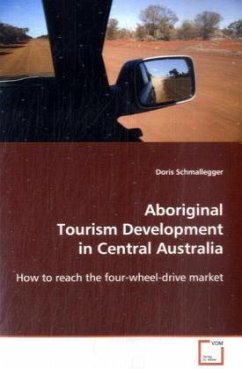Aboriginal cultural tourism has been recognised as
one of the main pillars of tourism in desert
Australia. Despite substantial investment by
government marketing and economic development
agencies, the success of Aboriginal tourism has been
limited in the past. Increasing the opportunities
for Aboriginal tourism development in remote desert
Australia might require an extended range and
diversity of products and new distribution
strategies to access new markets. This book reports
on a study that analysed the potential of the four-
wheel-drive (4WD) market to stimulate Aboriginal
tourism in central Australia. The study investigates
4WD travellers demand for Aboriginal tourism
products and analyses how these products need
to be distributed to reach this highly independent
and mobile market. The results of this research are
relevant to both tourism practitioners and academics
interested in the development of 4WD tourism and
Aboriginal tourism in some of the remotest parts of
Australia.
one of the main pillars of tourism in desert
Australia. Despite substantial investment by
government marketing and economic development
agencies, the success of Aboriginal tourism has been
limited in the past. Increasing the opportunities
for Aboriginal tourism development in remote desert
Australia might require an extended range and
diversity of products and new distribution
strategies to access new markets. This book reports
on a study that analysed the potential of the four-
wheel-drive (4WD) market to stimulate Aboriginal
tourism in central Australia. The study investigates
4WD travellers demand for Aboriginal tourism
products and analyses how these products need
to be distributed to reach this highly independent
and mobile market. The results of this research are
relevant to both tourism practitioners and academics
interested in the development of 4WD tourism and
Aboriginal tourism in some of the remotest parts of
Australia.








